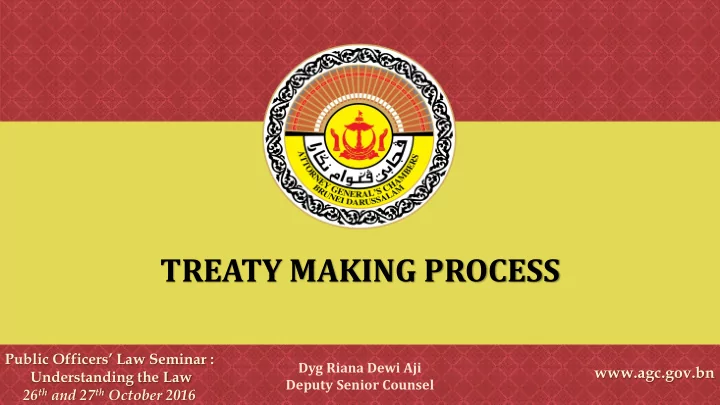

TREATY MAKING PROCESS Public Officers’ Law Seminar : Dyg Riana Dewi Aji www.agc.gov.bn Understanding the Law Deputy Senior Counsel 26 th and 27 th October 2016
Public Officers’ Law Seminar: Understanding the Law 26 th and 27 th October 2016 Outline of Presentation What is a Treaty? How to make a Treaty? How to conclude a Treaty? How to change or stop a Treaty?
Public Officers’ Law Seminar: Understanding the Law 26 th and 27 th October 2016 What? Vienna Convention on the Law of Treaties 1969 Article 2(1) defines a ‘treaty’ as: “an international agreement concluded between States in written form and governed by international law , whether embodied in a single instrument or in two or more related instruments and whatever its particular designation ”
Public Officers’ Law Seminar: Understanding the Law 26 th and 27 th October 2016 6 elements of a Treaty “an international “concluded “in written form” agreement” between states” “whether embodied “whatever its “governed by in a single or more designation” international law” number of instruments”
Public Officers’ Law Seminar: Understanding the Law 26 th and 27 th October 2016 “an international agreement” International character Inter-state, inter-governmental, inter-ministerial, international organisations Universal or regional Bilateral, multilateral or plurilateral
Public Officers’ Law Seminar: Understanding the Law 26 th and 27 th October 2016 “concluded between States” State and another State State and an international organisation χ State and international or multinational company χ Non-state institution and foreign non-state institution
Public Officers’ Law Seminar: Understanding the Law 26 th and 27 th October 2016 “in written form” Excludes oral agreements Allow for modern technology eg. Fax, email Permanent and readable form
Public Officers’ Law Seminar: Understanding the Law 26 th and 27 th October 2016 “governed by international law” Two aspects: 1. Rights and obligations created under international law 2. Distinct from rights and obligations under domestic law
Public Officers’ Law Seminar: Understanding the Law 26 th and 27 th October 2016 “whether embodied in a single instrument or in two or more related instruments” Framework Agreement Additional Protocols Annexes, appendices and schedules Side letters and exchange of notes
Public Officers’ Law Seminar: Understanding the Law 26 th and 27 th October 2016 “whatever its particular designation” No systematic use of titles Convention, Agreement, Treaty MOUs, Declarations, Exchange of Notes Content is more crucial
Public Officers’ Law Seminar: Understanding the Law 26 th and 27 th October 2016 Differences with MOU Publicly available Specific rights and obligations Formal Dispute settlement Funding involved
Public Officers’ Law Seminar: Understanding the Law 26 th and 27 th October 2016 Drafting Process Negotiations • Bilateral: e.g. BJEPA, Visa Exemptions • Multilateral: UN Conventions • Plurilateral: Trans Pacific Partnership Agreement • Regional: ASEAN
Public Officers’ Law Seminar: Understanding the Law 26 th and 27 th October 2016 Drafting Terminology Treaties (Legally Binding) MOUs ( Non Legally Binding) Shall May Have agreed as follows Have entered into the following undertaking Agree Accept/approve Done Signed Article Paragraph Enter into force Come into effect
Public Officers’ Law Seminar: Understanding the Law 26 th and 27 th October 2016 How to Conclude “Consent to be Bound” Vs “Entered into Force”
Public Officers’ Law Seminar: Understanding the Law 26 th and 27 th October 2016 How to Conclude Legal Scrubbing Powers to Conclude Signature Ratification Accession
Public Officers’ Law Seminar: Understanding the Law 26 th and 27 th October 2016 Legal Scrubbing Drafting Guidelines Editorial amendments No substantive changes
Public Officers’ Law Seminar: Understanding the Law 26 th and 27 th October 2016 Powers to Conclude Full Powers Automatic: Heads of States, Govts and Foreign Ministries Heads of diplomatic missions Accredited representatives
Public Officers’ Law Seminar: Understanding the Law 26 th and 27 th October 2016 Consent to be bound Article 11, VCLT “The consent of a State to be bound by a treaty may be expressed by signature , exchange of instruments constituting a treaty, ratification , acceptance, approval or accession , or by any other means if so agreed”
Public Officers’ Law Seminar: Understanding the Law 26 th and 27 th October 2016 Signature
Public Officers’ Law Seminar: Understanding the Law 26 th and 27 th October 2016 Ratification Display of “consent to be bound” on the international plane Different from need for parliamentary approval AGC’s position: “ratify ready”
Public Officers’ Law Seminar: Understanding the Law 26 th and 27 th October 2016 Ratification Why more time? Require legislation Require Parliamentary Approval Consider any implications
Public Officers’ Law Seminar: Understanding the Law 26 th and 27 th October 2016 Ratification Instrument of Ratification ( MOFAT ) Full Powers Must identify: When When & & Title Who is where where signing Concluded issued Treaty Depository
Public Officers’ Law Seminar: Understanding the Law 26 th and 27 th October 2016 Accession Usually, where State unable to sign Multilateral treaties Instrument of Accession
Public Officers’ Law Seminar: Understanding the Law 26 th and 27 th October 2016 Entry into force Legally bound Only on countries who have expressed CTTB Manner of entry into force: • Specified date • After a certain number of countries expressed CTBB • Proportion of GDP
Public Officers’ Law Seminar: Understanding the Law 26 th and 27 th October 2016 Amendment Bilateral Multilateral Supplementary Treaties (amending Protocols)
Public Officers’ Law Seminar: Understanding the Law 26 th and 27 th October 2016 Duration Specified time period Automatic renewal vs Review process Extension of Treaties
Public Officers’ Law Seminar: Understanding the Law 26 th and 27 th October 2016 Termination Conclusion of implementation Renewed by a new Treaty Breach Supervening impossibility of performance Fundamental change of circumstances
QUESTION AND ANSWER SESSION Public Officers’ Law Seminar : www.agc.gov.bn Understanding the Law 26 th and 27 th October 2016
THANK YOU Public Officers’ Law Seminar : riana.aji@agc.gov.bn www.agc.gov.bn Understanding the Law +673-2244872 (ext 327) 26 th and 27 th October 2016
Recommend
More recommend